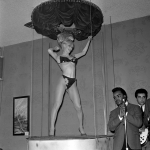(Note: This story appears in the May 2022 issue of ED Magazine)
Stephanie Wilbanks has been hailed by Jerry Westlund as an integral part of the smooth operations at the Pony Club chain and she is emblematic of what a sustainable career in the industry can provide.
Pony Clubs’ Operations Director Stephanie Wilbanks came from a small Mississippi town. When an IHOP opened, it was big news. Young and broke, Wilbanks started waitressing at that IHOP at 14 — then the legal age for employment. Four years later as a rising star with a young daughter, Wilbanks moved into management as she started college, then on to a corporate training job for a restaurant chain while promoting weekend parties for extra money.

At 24, her meteoric rise came to a halt when she was laid off with the lowest seniority. At best, she was ambivalent about how a strip club position would look on her resume, but with a four-year-old to support, Jerry Westlund’s offer: a 40-hour daytime job with zero travel, was irresistible.
ED Magazine’s Legal Correspondent, Larry Kaplan, spoke with Wilbanks about leaving corporate America and her unexpected career overseeing the Pony Club chain’s operations.
ED: You’re a second-generation adult nightclub operator. Tell me about how you got started with Jerry Westlund?
WILBANKS: My dad, Rex Wilbanks, who worked for Jerry, said Jerry had a venue where he was doing events, but the people operating it were failing. The club was awesome. One half was a strip club, the other, a live side. Jerry rented it out for events and concerts. I put together a presentation about how I’d throw the parties. I met with Jerry’s regional manager and sealed the deal.
I started renting it on weekends, initially as a mini-nightclub. Jerry came by and checked on operations periodically. I was doing the clubs and the party promoting while still doing full-time restaurant training. Then, I got laid off from the trainer position. Jerry happened to come by that day. At 24, I’d always been a superstar and was crushed. He called me that following Monday to offer a job. He wanted to utilize my customer service and hospitality skills to train his managers and audit his operations’ numbers to find sales opportunities and keep everybody honest.
I explained I wasn’t sure how working for strip clubs would look on my resume. Jerry responded, “I’ll give you a Monday through Friday 8-5 position. You can still do your club thing on the weekends.” With a four-year-old, a 40-hour weekday job sounded great. So I took that position and turned the parties I was throwing into a nightclub called Spectrum, which became Memphis’s number one nightclub for seven solid years.
ED: Tell me about the perspective working in the office, rather than the individual facilities, gave you on the club operations?
WILBANKS: Initially, I focused on the numbers, watching how the managers did promotions, what worked and what didn’t, and what we did and didn’t spend money on. I knew nothing about the industry, dealing with contractors, or even how to talk to the girls, let alone their motivations.
Jerry’s businesses were growing, so I got to do some incredible things, including negotiating national accounts. Jerry walked me through radio and billboard accounts, explaining the industry buzzwords, things I should make sure to say, and the numbers we wanted to hit. He was so patient. I didn’t know then, and I don’t think he knew that he’d someday be grooming me for this position. When we went from cash registers to POS systems, I was responsible for the build-out and transitioning. That helped prepare me for this role.
About seven years ago, I gave up the nightclub to focus exclusively on the operations and assumed a regional position with Jerry. I began overseeing the management teams of four clubs, helping them build sales.

ED: Did being a woman provide opportunities for different insights as a regional manager with entertainers and others?
WILBANKS: Being a woman has never been anything but beneficial. The girls are comfortable coming to me about anything. Being a mother has also helped my interaction with our young people. Parenting provides a different sense of patience. I can approach an unruly guest, and they’ll never see me as hostile as long as I’m smiling.
ED: How much of that has to do with working for Jerry?
WILBANKS: Jerry is very girl-centric. He’d forecast what challenges I might encounter, allowing me to process them before they happened. And he’s always been very focused on how entertainers are treated and how critical they are to the industry. And that the girls need to use the industry, not the industry use the girls. We’ve operated that way because his vision differs from other operators.
ED: What exactly does your job consists of, and describe a typical work week?
WILBANKS: A typical work week involves attending most manager meetings for each club. I’m on the road quite a bit; I visit at least two clubs a week, taking care of different operational things and ensuring everybody’s compliant and running smoothly. So much of it consists of getting out there, visiting our people, being in front of them, and getting to know them. We’re a very family-oriented business. We want to know our people, who they are, their kids’ names, and what their struggles are. We want to know how to work with them and get the most out of them. We have a low management turnover rate. Many of our people have been with us for 10-plus years.
We’re not just about the numbers. I love it when a new manager’s getting his first house, and that’s because he’s building a career with us. That’s what our management relationships are like—or helping a new entertainer get her first car or first bank account. They’re genuinely phenomenal people, and we wouldn’t even have an industry if they hadn’t dared to step out in front of the crowd.
“We’re a very family-oriented business. We want to know our people, who they are, their kids’ names, and what their struggles are. We want to know how to work with them and get the most out of them. We have a low management turnover rate. Many of our people have been with us for 10-plus years.” — Stephanie Wilbanks
ED: What specific challenges do you experience in operating so many operations?
WILBANKS: Finding time to talk to everybody daily. We stay in touch with our people to keep them in the right direction because management can quickly go awry. Each morning, I make a list of calls for that day. It’s just making sure that everybody feels involved.
ED: What common denominators are there in your club markets?
WILBANKS: Each club is as unique as its town. We’re in many college towns and a few large cities. The back-of-house operations are always identical, but the front-of-house is always a little different.
ED: How is Jerry different from other business people you’ve worked with?
WILBANKS: He stays in touch with his people and management teams and visits each location at least bi-monthly. He’s constantly on the go. He differs from other operators, who, by this point, would probably rather just sit back and enjoy what they had.
ED: What’s a quality you’ve acquired or refined working for Jerry that’s helped you at your job.
WILBANKS: It’s people skills. While I had them initially, being around him for 14 years, learning from how he interacts with people has helped expand my mindset to look for other options because there’s always somewhere to go.
ED: What’s the best part of your job; conversely, what’s most challenging?
WILBANKS: The best part is cultivating relationships; getting to know different types of people. There’s something to learn from everyone. The GM, the bartender, or the door guy may have great ideas. The most challenging part is constantly traveling. It’s challenging to maintain a home base. Our operations are so close that we generally drive. Last year, I got a new truck, and it’s already got 75,000 miles!
ED: Is there one aspect of your job that’s an unexpected reality, an obligation or responsibility you wouldn’t have fathomed that’s now second nature to you?
WILBANKS: The fact I must constantly defend that our nightclubs are real businesses. We’re under more regulation than most other businesses. It’s realizing all the intricate parts that make an industry like this work. That makes this something that surprised me; coming from a nine-year corporate background and then working for an independent operator, it was a night-and-day experience. At first, I thought, you need to do this corporate thing and that corporate thing, then I learned that you can over-manage someone with those processes and procedures.
ED: If you had other club operations people and GMs, male and female, in a room and could share some advice, what would you like to tell them?
WILBANKS: Stay in touch with your people. These are our soldiers on the ground; if they don’t believe in our vision, we’ll never hit our goals.
Larry Kaplan has for 21 years been the Legal Correspondent for ED Publications. In addition, Mr. Kaplan is a business broker in the sale and purchase of adult nightclubs and adult retail stores and the Executive Director of the ACE of Michigan adult nightclub state trade association. Contact Larry Kaplan at 313-815-3311 or email larry@kaplanclubsales.com.


























